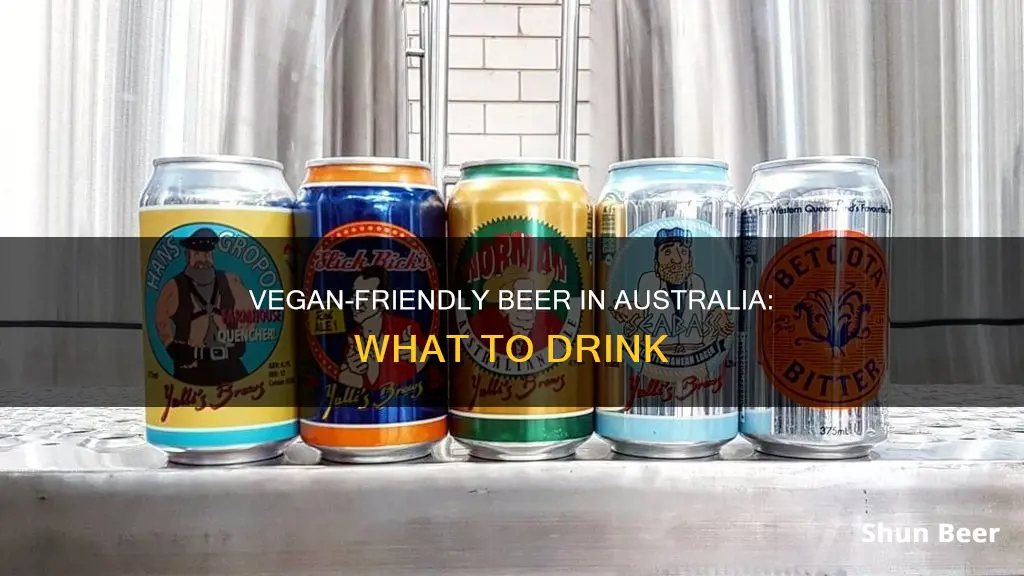
Vegans can drink most beers, as the core ingredients in beer—barley malt, water, hops, and yeast—are all vegan-friendly. However, some brewers add finings to clarify the beer, and these finings can include animal-derived products like isinglass, gelatin, lactose, and honey. These ingredients are often not listed on the label, so vegans may need to do some research to determine if a particular beer is suitable for them. Luckily, there are resources like Barnivore.com, which tracks vegan beers globally, and many vegan beers are available in Australia.
| Characteristics | Values |
|---|---|
| Core ingredients | barley malt, water, hops, yeast |
| Other ingredients | oats, rye, wheat |
| Non-vegan additives | lactose, honey |
| Clarifying agents | isinglass, gelatin, glycerol monostearate |
| Vegan fining agents | carrageenan, biofine, Irish moss |
What You'll Learn

Common non-vegan beer ingredients
While beer is typically made from barley malt, water, hops, and yeast, which are all vegan-friendly, some brewers add finings to clarify the beer. These finings can be derived from plants, like Irish moss, or animals, making the beer unsuitable for vegans. Here are some common non-vegan beer ingredients:
Isinglass
Isinglass is the most common fining used to clarify beer, particularly cask ales. It is produced from the swim bladders of fish, and while it efficiently and affordably removes the hazy yeast from beer, it is not vegan-friendly.
Gelatin
Gelatin is a protein made by boiling animal body parts, such as skin, tendons, ligaments, and bones. It is often used in beer, wine, cosmetics, and sweets as a clarifying agent.
Albumin
Albumin is a protein derived from animal fluids and tissues, such as egg whites or blood serum. It is used as a foaming agent in beer production to improve the stability and texture of the beer's foam head.
Casein
Casein is a milk protein that is sometimes used in the fining process of beer and wine manufacturing. It aids in clarifying the beer by binding to suspended particles and yeast, helping to remove them.
Lactose
Lactose is a sugar derived from milk. It is added to certain styles of beer, such as milk stouts, to impart sweetness and a creamy texture. Lactose cannot be fermented by brewing yeast, so it remains in the beer to sweeten and thicken the mouthfeel.
Honey
Honey is added to some beers for flavouring or to increase their alcohol content. As an animal-derived product, honey is not suitable for vegans.
Exploring Panama City Beach: Beer and Beachside Relaxation
You may want to see also

Vegan-friendly alternatives to animal-based finings
While most beers are vegan-friendly, some brewers use animal-based finings in the brewing process, which makes those beers unsuitable for vegans. Vegan-friendly alternatives to animal-based finings include:
Carrageenan
Carrageenan is a type of seaweed, also known as Irish moss. It is used to clarify vegan beer during the boiling process.
Biofine
A vegan-friendly colloidal silicic acid solution, Biofine helps accelerate beer clarity without the use of animal products.
Algae
Algae is a good alternative to fish-based products and can be used in beer to add a savoury and salty flavour. It can be added to beer, giving it a marine flavour reminiscent of the sea. Algae is also a good source of valuable minerals, vitamins, antioxidants, and omega-3 fatty acids.
Tofu
Tofu is made from soaked soy beans and has a relatively neutral taste, making it a good base for vegan alternatives. It can absorb spices and marinades, such as vegan fish broth, and can be used to make vegan fish fingers, burgers, or fillets.
Seitan
Seitan is made from gluten harvested from wheat, spelt, and other cereals. Like tofu, it has a neutral taste and can be seasoned and marinated. It is often used as a base for plant-based fish fillets and burgers.
Jackfruit
Jackfruit has a fibrous consistency, making it an ideal fish alternative. It can be used to prepare vegan fish cakes or fillets, depending on the seasoning.
Drinking Beer at Long Branch: What You Need to Know
You may want to see also

How to identify vegan beer
Most beers are vegan-friendly, but not all. The basic ingredients of beer are yeast, water, hops, and grain—all vegan-friendly. However, some beers use non-vegan finings in their brewing process, which means they are not suitable for vegans.
- Albumin—a protein obtained from animal fluids and tissues and used as a foaming agent.
- Bone char—made from burned animal bones and used to filter the beer.
- Carmine—a crimson dye derived from cochineal insects; used in red and pink ales.
- Casein—a milk protein that clarifies the liquid.
- Chitin/Chitosan—fining agents generated from the exoskeletons of lobsters, crabs, and shrimps, but they can also come from fungus.
- Gelatin—a fining agent derived from animal body parts and used as a clarifying agent.
- Glycerol monostearate—a foaming agent commonly derived from animal fats, but it can also be sourced from plants.
- Honey—an animal-derived component used to flavour beer, increase its alcohol content, or as the base for mead.
- Isinglass—a collagen formed from the dried swim bladders of fish, used to make the beer clearer and brighter.
- Lactose—a sugar found in milk, used to sweeten and thicken the mouthfeel of the beer, commonly used in "milk" or "cream" stouts.
- Whey—a dairy flavouring additive with a unique flavour and creamy texture.
These ingredients are unlikely to be listed on the beer label, especially when used in the fining process.
So, how can you identify if a beer is vegan-friendly?
- Research the company—researching the company's values and history regarding the sale of vegan products will give you an idea of whether their beers are vegan-friendly.
- Check the website Barnivore—this online directory uses crowdsourcing to identify and evaluate the vegan-friendliness of over 55,000 adult beverages.
- Use the BevVeg app—this free mobile app is managed by an international law firm that certifies vegan beer, wine, liquor, and other products.
- Contact the brewer directly—if you want the most up-to-date answer, contact the brewer directly and ask if a particular beer uses any animal ingredients in the manufacturing process.
Some popular vegan-friendly beers include Heineken, Budweiser, Stella Artois, Corona, and Beck's.
Beer Subscriptions: How Do They Work?
You may want to see also

Vegan beers in Australia
Most beers are vegan, as they are typically prepared from barley malt, water, hops, and yeast. However, some brewers use non-vegan finings in their brewing process, which means some beers are not suitable for vegans.
How to know if a beer is vegan
The fining process determines whether a brewer can label beer as vegan. This stage removes yeast and contaminants, resulting in a clear beverage. However, some beers use non-vegan fining agents such as isinglass, gelatin, or lactose, which contain animal by-products. These ingredients are unlikely to appear on the label, especially when used in the fining process.
Vegan-friendly alternatives to animal-based finings
- Carrageenan – a type of seaweed, also known as Irish moss, that clarifies vegan beer during the boiling process.
- Biofine – a vegan-friendly colloidal silicic acid solution that accelerates beer clarity.
There are many vegan beers available in Australia, and some breweries produce exclusively vegan beers. Here is a list of some vegan beers from Australia:
- 2 Brothers Brewery (Australia) – Grizz, Growler, Kung Foo, Pay Day, and Taxi.
- 3 Ravens Brewery, Australia – 55 American Pale Ale, Acid Original Sour, Black Oatmeal Stout, Christmas Trifle Shake Milkshake IPA, Coffee & Blueberry Shake Milkshake IPA, Dark Smoked Dark Ale, English ESB, Galaxy Juicy NEIPA, Golden Altbier, Heavy Double IPA, Juicy Brut NEIPA, Milkshake IPA, New World IPA, Orange Juicy NEIPA, Pine & Lime Creamsicle Sour, Queen's Secret Victorian IPA, Salted Caramel Shake Milkshake IPA, Simcoe Juicy NEIPA, Thornbury Pilsner, Tropical Pale Ale, White Witbier, and Yuzu Juicy NEIPA.
- 4 Pines Brewing Company, Australia – American Amber Ale, Indian Summer Ale, In Season IPA, and Seasonal Beers.
- Arctic Fox Brewing, Australia – Badlands Acronym Abuse Chapter Three NEIPA, Badlands Brewbacca Kolsch, Badlands Draughty Kilt, Badlands FashioNEIPA, Badlands JAXON Red IPA, Badlands New World Pilsener, Badlands Nori Roll Gose, Badlands Only a Ginger, Badlands Trinity Porter, and Badlands U-Boat German Style Lager.
- Bad Shepherd Brewing Co., Australia – Almighty Imperial IPA, American Pale Ale, Brew Crew Bigsi’s Baltic Porter, Brew Crew SMaSH IPA, California Lager, Double Choc Hazelnut Brown, Double choc hazelnut brown ale, ESB by Dan (The Barman), Hazelnut Brown, New World IPA, Oatmeal Stout, Pineapple Sour Ale, Raspberry Wheat Ale, Reserve Rd Draught, Russian Imperial Stout, The Darkling, and Tiny IPA.
- Balter Brewing Company, Australia – Handsome Elvis.
- Barossa Valley Brewing, Australia – Bee Sting Golden Ale, Coffee Chocolate Stout, Ganis Major IIPA, Hop Heaven Easy IPA, I Can't Believe It's Not Bacon, Indian Summer Session Ale, and VitaminB(eer).
- Barrow Boys Brewing Co., Australia – Pedlars Pale, Red Sky Wheat, and Stormy Lager.
Chemo and Alcohol: Is Drinking Beer Safe?
You may want to see also

Non-vegan beers in Australia
Most beers are vegan, as they are usually prepared from barley malt, water, hops, and yeast. However, some brewers use non-vegan finings in their brewing process, which means that some beers are not vegan-friendly. These non-vegan finings are used to remove yeast and contaminants, resulting in a clear beverage.
Non-vegan fining agents include isinglass, gelatin, or lactose, which contain animal by-products. Isinglass, for example, is derived from the dried swim bladders of fish and is used to make the beer clearer and brighter. Other non-vegan ingredients used in the fining process include albumin, bone char, casein, chitin/chitosan, glycerol monostearate, and honey.
In Australia, some popular beer brands use non-vegan finings in their brewing process, making their beers unsuitable for those following a vegan lifestyle. Here are some examples of non-vegan beers that are available in Australia:
- Barossa Valley Brewing: They offer a range of beers that are not vegan-friendly, such as the Barossa Valley Bee Sting Golden Ale, Barossa Valley Coffee Chocolate Stout, and Barossa Valley I Can't Believe It's Not Bacon. These beers may contain ingredients like honey, lactose, or isinglass, which are not suitable for vegans.
- Badlands Brewery: Many of their beers are listed as non-vegan, including the Badlands Acronym Abuse Chapter Three NEIPA, Badlands Brewbacca Kolsch, Badlands Draughty Kilt, and Badlands JAXON Red IPA. These beers may use non-vegan finings or contain ingredients like honey or lactose.
- Bad Shepherd Brewing Co.: Their range of beers, such as the Bad Shepherd Almighty Imperial IPA, Bad Shepherd Double Choc Hazelnut Brown, and Bad Shepherd Oatmeal Stout, are also listed as non-vegan. These beers likely contain dairy products or other non-vegan ingredients.
- 2 Brothers Brewery: Some of their beers, including 2 Brothers Grizz, 2 Brothers Growler, and 2 Brothers Kung Foo, are not considered vegan-friendly.
- 3 Ravens Brewery: While they have several vegan options, beers like 3 Ravens Milkshake IPA and 3 Ravens Salted Caramel Shake Milkshake IPA are not suitable for vegans due to the use of lactose or other dairy products.
It is important to note that the information on vegan and non-vegan beers may not always be readily available, as companies are not required by law to disclose these details. However, with the growing popularity of veganism, many breweries are becoming more transparent about their ingredients and processes.
Prednisone and Beer: Is It Safe to Mix?
You may want to see also
Frequently asked questions
The short answer is "usually yes". Beer is often made from barley malt, water, hops and yeast, and so is vegan-friendly. However, some beers are made using animal-derived ingredients, such as lactose from cow's milk or honey.
Non-vegan ingredients in beer include lactose, honey, isinglass, gelatin, glycerol monostearate, casein, bone char, carmine, albumin, chitin/chitosan, glycerin, and whey.
These ingredients are added to the beer during the fining process to clarify the beer and remove yeast and contaminants, creating a crisp, clear beverage.
It can be challenging to determine if a beer is vegan-friendly, as companies are not required to disclose this information. However, some resources, such as Barnivore.com, provide a database of vegan beers. Additionally, vegan-friendly beers may be labelled as such on their packaging.







